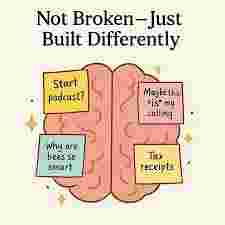ADHD and anxiety frequently occur together, creating a complex interplay of symptoms that can affect daily life, relationships, and academic or professional performance. Understanding how symptoms of ADHD relate to anxiety is crucial for effective management. While ADHD medication addresses core attention and impulse-control issues, comprehensive treatment of ADHD often requires additional strategies to manage co-occurring anxiety.
How ADHD and Anxiety Are Connected
The connection between ADHD and anxiety is multifaceted:
-
Overwhelm and Executive Dysfunction: Difficulty with planning, organization, and time management can increase stress and worry.
-
Impulsivity Consequences: Impulsive actions may lead to negative feedback from peers, teachers, or colleagues, fueling anxious thoughts.
-
Sensitivity to Stimulation: ADHD brains often process sensory input differently, making certain environments more stressful.
-
Emotional Dysregulation: Both ADHD and anxiety involve challenges in managing emotional responses, leading to heightened reactivity.
Recognizing the overlap between Symptoms of ADHD and anxiety is the first step toward effective management.
Identifying Co-Occurring Anxiety
Anxiety can manifest differently in individuals with ADHD, including:
-
Excessive worry about performance or outcomes.
-
Restlessness or inability to relax.
-
Muscle tension, headaches, or other physical symptoms.
-
Difficulty sleeping or staying asleep.
-
Avoidance of tasks that feel overwhelming or uncertain.
Monitoring these signs helps in creating a targeted treatment of ADHD plan that addresses both ADHD and anxiety.
The Role of ADHD Medication
ADHD medication primarily targets attention, hyperactivity, and impulsivity, but it can indirectly affect anxiety:
-
Improved focus can reduce stress related to unfinished tasks.
-
Better organization may decrease feelings of overwhelm.
-
Emotional regulation benefits may help mitigate reactive anxiety.
However, stimulant medications may sometimes exacerbate anxiety in sensitive individuals. Healthcare providers may adjust dosage, switch medication types, or combine medication with therapy to ensure optimal outcomes.
Behavioral and Cognitive Approaches
Therapies addressing both ADHD and anxiety can provide practical coping tools:
-
Cognitive Behavioral Therapy (CBT): Helps identify negative thought patterns and develop constructive strategies.
-
Behavioral Interventions: Establishing routines and structured schedules reduces unpredictability that can trigger anxiety.
-
Mindfulness Practices: Meditation, deep breathing, and grounding exercises improve focus and reduce stress.
-
Exposure Techniques: Gradually facing feared tasks can increase confidence and decrease avoidance behaviors.
Integrating these approaches enhances the effectiveness of ADHD medication in daily life.
Organizational Strategies to Reduce Anxiety
Practical systems can reduce both ADHD-related disorganization and anxiety:
-
To-Do Lists and Planners: Visual reminders help manage tasks and deadlines.
-
Time-Blocking: Scheduling focused periods reduces procrastination-induced stress.
-
Decluttered Environments: Clear workspaces minimize sensory overload.
-
Task Prioritization: Breaking down large projects into smaller steps reduces feelings of overwhelm.
These strategies target symptoms of ADHD while lowering anxiety levels.
Lifestyle Interventions
Daily habits can support emotional stability:
-
Exercise: Physical activity reduces stress, improves mood, and enhances focus.
-
Nutrition: Balanced meals with protein, complex carbohydrates, and essential nutrients stabilize energy and cognitive function.
-
Sleep Hygiene: Consistent routines and adequate rest decrease irritability and anxiety.
-
Stress Management: Journaling, creative outlets, and relaxation techniques help regulate emotions.
Combined with ADHD medication, these lifestyle adjustments improve overall well-being.
School and Workplace Considerations
Supportive environments can lessen anxiety for individuals with ADHD:
-
Flexible Deadlines: When possible, allow adjustments to prevent unnecessary stress.
-
Clear Instructions: Written guidance reduces confusion and anxiety about expectations.
-
Quiet Workspaces: Minimizing distractions aids focus and reduces sensory overload.
-
Regular Check-Ins: Teachers, supervisors, or mentors provide reassurance and accountability.
These accommodations reinforce both ADHD management and anxiety reduction strategies.
Integrating Support Systems
Emotional and social support is vital:
-
Family Education: Teaching families about ADHD and anxiety improves understanding and empathy.
-
Peer Support Groups: Connecting with others who share similar challenges reduces isolation.
-
Professional Guidance: Regular sessions with therapists or coaches ensure strategies are tailored to individual needs.
Support systems enhance the overall treatment of ADHD plan and foster resilience.
Final Thoughts
ADHD and anxiety often intersect, creating a cycle of distraction, overwhelm, and worry. Understanding symptoms of ADHD in the context of anxiety allows individuals to pursue comprehensive care. While ADHD medication addresses neurological aspects of attention and impulse control, behavioral strategies, organizational tools, lifestyle adjustments, and emotional support are essential for holistic management.
By combining medication with therapy, structured routines, and supportive environments, individuals can reduce anxiety, improve focus, and lead more balanced, fulfilling lives. Recognizing the connection between ADHD and anxiety is the first step toward transforming challenges into manageable and meaningful growth opportunities.




